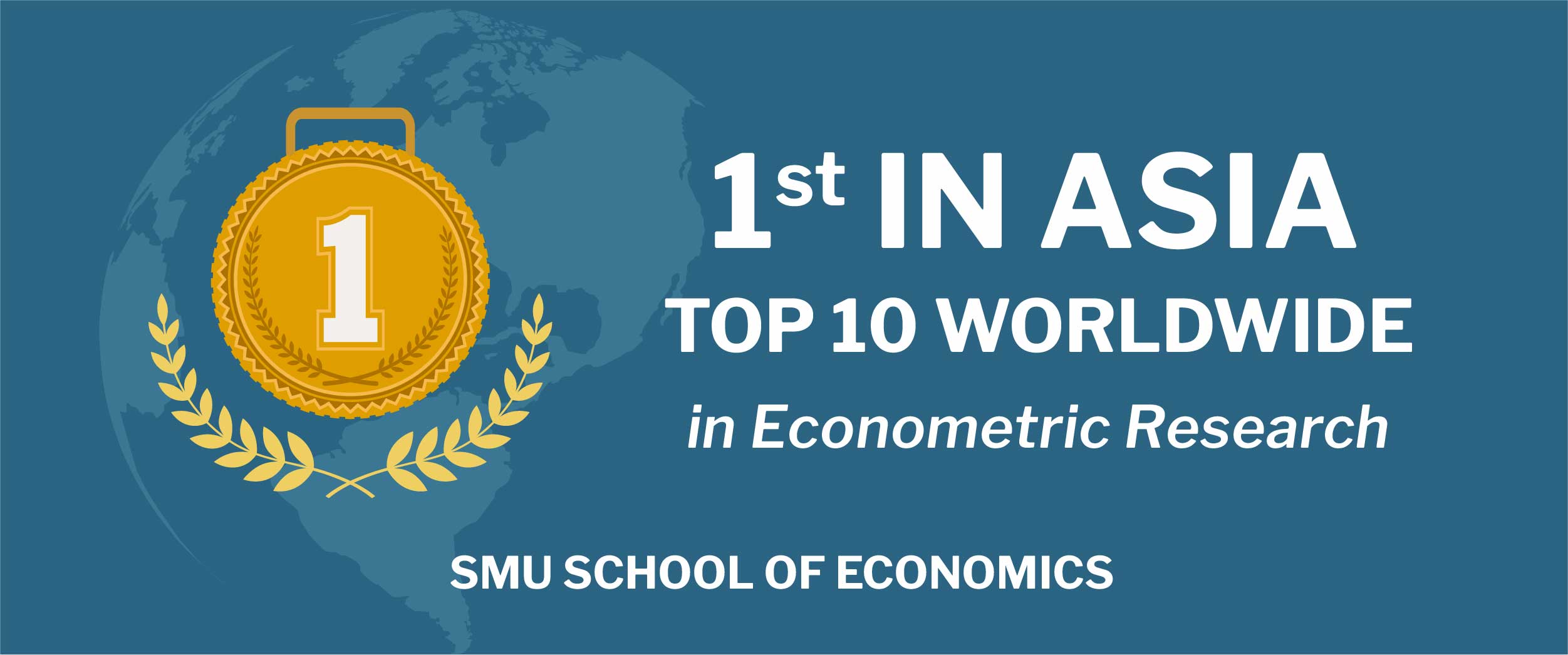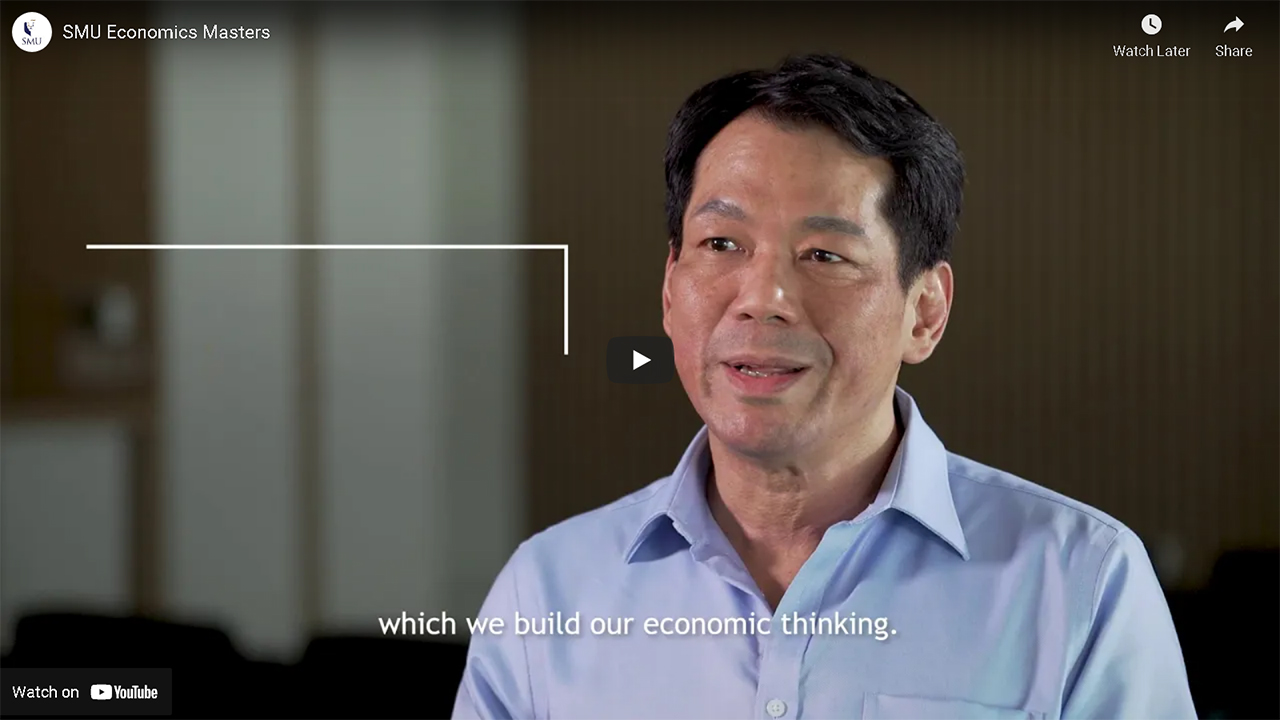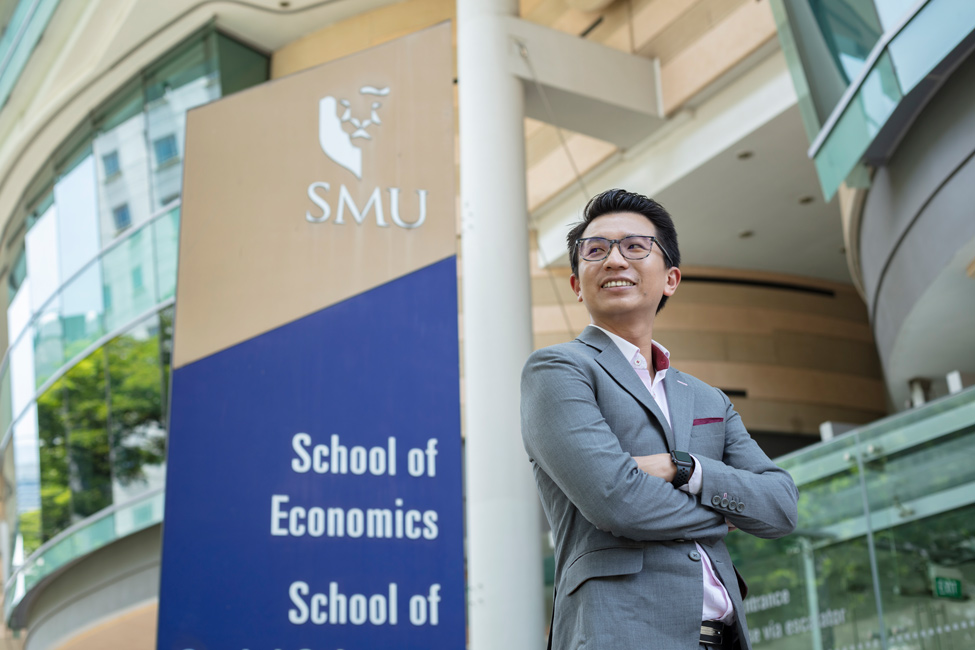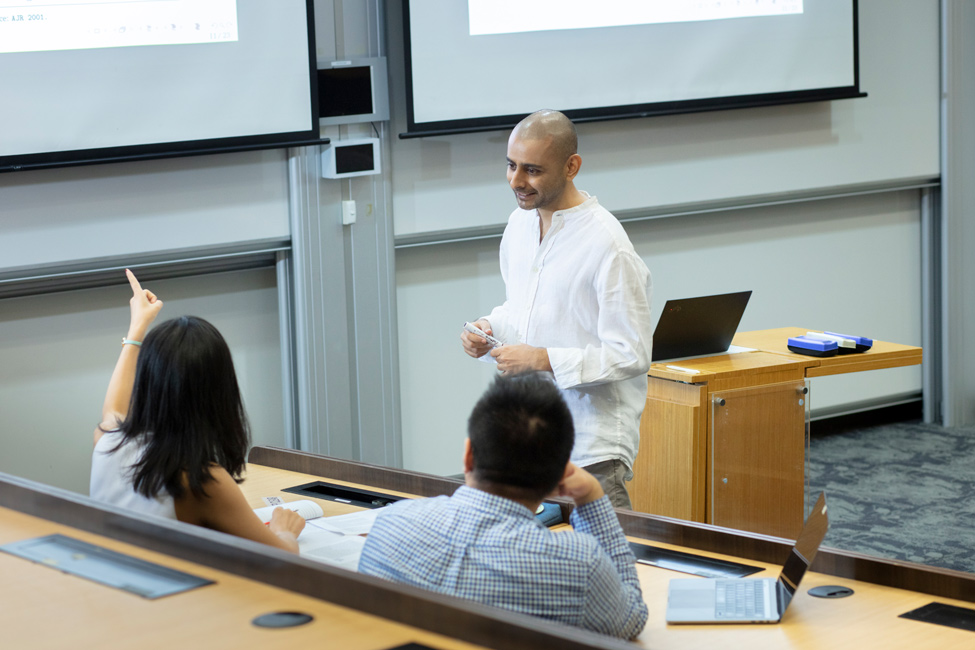AUGUST / JANUARY INTAKE
18 Months Full-Time (with flexibility to complete in 12 months)
30 Months Part-Time (with flexibility to complete in 24 months)TUITION FEE
S$49,050 TUITION FEE (INCLUSIVE OF GST)
APPLICATION CLOSES
August Intake: 30 June 2025
January Intake: 30 November 2025
Applications Now Open for Jan 2026 Intake!
Click here to sign up now for SMU Economics Masters online information session (in Chinese) on 23 Oct and learn more about applications for Jan 2026 intake!
For 1-1 consultation, please contact our admission consultant here.
About The Master of Science in Economics
Key Programme Updates – Effective August 2026 Intake
We are introducing important changes to the MSE programme starting from the August 2026 intake to offer greater flexibility and inclusiveness:
- Expanded Admissions & Pathways
The August intake will now be open to students from diverse academic backgrounds. Foundation courses will be provided to bridge any knowledge gaps. Students with strong quantitative backgrounds may be exempted from these courses and complete the programme in 12 months — the accelerated pathway, available in both August and January intakes. - Updated Duration & Tuition
For students taking foundation courses, the August intake will span 1.5 years, with tuition fees adjusted accordingly. Accelerated students will continue to follow the 12-month track with corresponding tuition. - Curriculum Enhancement
The foundation component will be reduced by 1 CU, and the open component increased by 1, allowing for more flexibility and personalization while maintaining a strong academic foundation.
The Master of Science in Economics, with tracks in Applied Economics (AE), Econometrics and Quantitative Economics (EQ), is a programme offering in-depth study of economics and economic data analysis. It includes an entry pathway for students without prior training in economics. You will follow a strong core programme, as well as a track system that allows you to opt for a more practice-oriented, more data-analytic and theoretical focus, along with an open category that allows you to take courses outside your track, or from other programmes. This allows you to create a fulfilling programme suited to your needs. The MSc in Economics is available for part-time or full-time study.
We seek students with a keen sense of purpose and curiosity about economics. You may consider the Applied Economics track if you are a working professional who makes or will be making critical and strategic decisions in your company or public sector agency and who could benefit tremendously from a good understanding of the market and the economy. The Econometrics and Quantitative Economics track is an option if you wish to learn more about data analysis with a special focus on economic, financial and social data. You may wish to pursue careers involving technical economics research, or further graduate study in Economics.
Why pursue the SMU MSE?
-
1
FLEXIBLE
Benefit from a track system that allows you to opt for a more practice-oriented or a more data-analytic and theoretical focus.
-
2
PRACTICAL
Learn economic management and policy analysis skills for strategic decision making.
-
3
CAREER FOCUSED
Master economic theories and econometric tools for analysing economic, social and financial data.
-
4
STRONG MIX OF FACULTY
Learn from frontline researchers, teaching specialists, industry practitioners and professionals.
Class Profile
-
 Average Age
Average Age22 - 31 yrs
-
 Gender
Gender45.8(M) : 54.2(F)

Testimonials
Industries MSE Graduates Work In
-
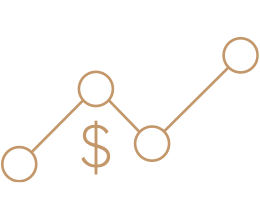 Business / Financial Services
Business / Financial Services19%
-
 Consulting
Consulting13%
-
 Investment / Securities
Investment / Securities10%
-
 Education
Education10%
-
 Public Sector
Public Sector8%
-
 Healthcare
Healthcare8%
-
 Fintech
Fintech6%
-
 Telecommunications
Telecommunications4%
-
 Manufacturing
Manufacturing4%
-
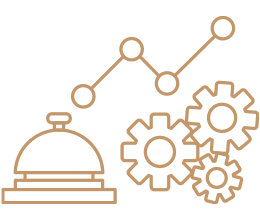 Others
Others18%

Programme Details
Programme Calendar
- AY2025-2026: Click here to download
- AY2024-2025: Click here to download
- AY2023-2024: Click here to download
Programme Structure and Tracks
The Master of Science in Economics (MSE) programme features a strong yet flexible core, tracks that sharpen your focus and a wide range of electives in your chosen track. You will also enjoy the flexibility to take courses outside of your track or programme for a fulfilling, personalised programme.
Applied Economics Track (full-time or part-time)
Gain a comprehensive understanding of global economic issues for strategic decision making in the public sector and corporate world. With an emphasis on applications, the AE track will give you the content knowledge of and familiarity with analytical frameworks in economics for analysing the events and complex issues we constantly confront.
Econometrics and Quantitative Economics Track (full-time, with part-time option if able to take weekday daytime classes)
Master economic theories and econometric tools for collecting and analysing economic, social and financial data, and be informed by well-founded insights in economic theory, practice and research. Focusing on modern and rigorous data analysis methods, this track covers regression analysis, time-series and forecasting methods, panel-data models, advanced economic theory and applications.
Note: Part-time study is available only to Singapore-based students (citizens, permanent residents, and those holding valid employment passes).
(Full-time and Part-time)
Part-time January Intake
Term
Term
Term
Term
Term
Term
Term
Term
Term
Term
Term
Term
Term
Term
August Intake
(Full-time and Part-time)
Full-time August Intake
Part-time August Intake
- Students may graduate as soon as graduation requirements are met, which may be before the expected completiondates indicated above. Maximum candidature is 2.5 years for full-time students, and 4 years for part-time students.
- Part-time students take 1-3 CU per regular term (Aug/Jan/Apr). Full-time students take 2-5 CU per regular term.
Programme Information
Programme Curriculum
The MSE is a 15 course unit (CU) programme with internship opportunities.
Each course unit (CU) comprises ten 3-hr sessions. The academic requirement for graduation is a Cumulative Grade Point Average (CGPA) of at least 2.50 out of 4.00.
The curriculum structure will be updated as follows effective August 2026.
Foundations (4CU)
The Foundations component is intended for students from non-Economics backgrounds who do not have the necessary training in economic theory and advanced quantitative techniques required by the MSE. Students with strong economics knowledge and advanced quantitative techniques are exempted from this component.
| MSE Programme Foundations |
|
Principles of Economics 1, Principles of Economics 2, Mathematics for Economics, Further Mathematics for Economics |
Core (3CU)
The MSE Core equips students with rigorous knowledge in microeconomics, macroeconomics, and econometrics, which provides the analytical framework on which sub-areas of economics are built. Students with very strong quantitative skills may apply to take the PhD level versions of these courses.
| MSE Programme Core |
|
Microeconomic Analysis, Macroeconomic Analysis, Econometric Analysis |
Track Electives (5CU)
Choose 5CU from the single track to attain track status. Not all courses are available every year, course titles and content are subject to change and new courses are added from time to time.
| Applied Economics Track Courses: | Econometrics and Quantitative Economics Track Courses: |
|
Health Economics |
Spatial Econometrics and Data Analysis |
* Not all courses are available every year, course titles and content subject to change, new courses added from time to time.
Open (2CU)
To enhance the academic experience and holistic development of the postgraduate students, flexibility is given to students to take courses from any MSE track/MSFE electives. Up to 1CU may be taken from pre-approved electives from other SMU Masters programmes. Student may choose to do a 10-week internship or a capstone project that satisfy a 1CU requirement.
*The Open component will expand to 3CU effective August 2026.
FOUNDATION COURSES
This course is divided into two main branches namely microeconomics and macroeconomics. While macroeconomics is concerned with the economy as a whole, microeconomics examines the individual parts of the economy and focuses on how individuals and firms make decisions and how these decisions interact. This course is designed to introduce learners to the fundamentals of economics by exposing them to the principal theories and models used by economists. It demonstrates how economics can be used by individuals and businesses alike to assess problems and develop solutions. It also examines the wider macroeconomic environment and the principles underlying monetary, fiscal policy and international trade.
This course introduces students to the rigorous mathematical foundations of economics. It offers students the necessary tools upon which modern economic analysis and modeling is based. This course emphasizes training in mathematics used in economics through the many economic applications in which mathematical tools are needed.
The course covers four main topics. The first part covers the basics, such as functions and set theory. The second part teaches matrix algebra in relations to equilibrium analysis, while the third part introduces the concept of comparative statics and the tools needed, derivatives. The fourth topic again uses derivatives to do a rigorous exposition on the most important skill in economics: optimization. In each part, there will be many economic applications to let students familiarize with the mathematical concepts in an economic context and learn their real-world usefulness.
This course continues from Principles of Economics 1 to cover government interventions in markets, consumer demands, firms and market structures in the first part.
The second part of the course introduces students to the basic micro-foundations of macroeconomics, namely the consumption-leisure and consumption-saving trade-offs. The third part of the course covers the foundational theories of macroeconomics: the classical and Keynesian theories.
This course is divided into two main branches namely microeconomics and macroeconomics. While macroeconomics is concerned with the economy as a whole, microeconomics examines the individual parts of the economy and focuses on how individuals and firms make decisions and how these decisions interact. This course is designed to introduce learners to the fundamentals of economics by exposing them to the principal theories and models used by economists. It demonstrates how economics can be used by individuals and businesses alike to assess problems and develop solutions. It also examines the wider macroeconomic environment and the principles underlying monetary, fiscal policy and international trade.
This course is divided into two main branches namely microeconomics and macroeconomics. While macroeconomics is concerned with the economy as a whole, microeconomics examines the individual parts of the economy and focuses on how individuals and firms make decisions and how these decisions interact. This course is designed to introduce learners to the fundamentals of economics by exposing them to the principal theories and models used by economists. It demonstrates how economics can be used by individuals and businesses alike to assess problems and develop solutions. It also examines the wider macroeconomic environment and the principles underlying monetary, fiscal policy and international trade.
This course introduces students to the rigorous mathematical foundations of economics. It offers students the necessary tools upon which modern economic analysis and modeling is based. This course emphasizes training in mathematics used in economics through the many economic applications in which mathematical tools are needed.
The course covers five main topics. The first part covers matrix algebra in relations to equilibrium analysis, while the second part introduces the concept of comparative statics and the tools needed, derivatives. The third topic again uses derivatives to do a rigorous exposition on the most important skill in economics: optimization. The fourth topic revisits matrices in the wider context of linear algebra, covering the important concepts of eigenvalues, eigenvectors and quadratic forms. The fifth part gives an introduction into the definition and meaning of integrals, which is important for understanding economic dynamics. In each part, there will be many economic applications to let students familiarize with the mathematical concepts in an economic context and learn their real-world usefulness.
Statistics abounds in our everyday lives, from economics to physics, accountancy to medicine, business to technology, geography to law, social science to politics, a veritable all-embracing giant. No discipline does well that disavows it or belittles it. Though many occupations may not require specialized statistics degrees, they demand at least a working application of statistics, and able competency with data crunching, statistical software and results management.
This course focuses heavily on running statistical analyses and applications through Microsoft Excel, with interpretation of results for sound decision making in practical cases, covering the basics to higher-level statistics. By the end of this course, students will:
- know the principles and elements of basic statistics;
- understand the need for data collection and summarize data sets into meaningful information;
- match and execute correct statistical procedures to different data types and write sound interpretations for use in practical decision-making
CORE COURSES
The course covers the foundations of Microeconomics, which constitute the fundamentals of economic analysis. The topics covered are: consumer choice (individual and aggregate), producer theory, decision making under uncertainty and principles of strategic interaction (game theory). In particular, the course will provide an introduction to normal form games, extensive form games of perfect and imperfect information and to the solution concepts that are developed for these. The last part of the course will introduce the principles of general equilibrium theory and study the fundamental theorems of welfare economics.
The course is structured in a formal manner, typical for its level, and makes use of language and tools from Mathematics. Proofs of results will be provided when needed, so as to get the student acquainted with the rigorous thinking and systematic approach that is an integral part of economic analysis. Knowledge of the mathematical tools needed by an Economist is required. A nonexhaustive list is: Calculus (continuity, differentiation, integration), Constrained and Unconstrained optimization (Kuhn-Tucker conditions), Probability theory, Linear Algebra.
This course explores major macroeconomic topics using the general equilibrium frameworks with micro-foundations. We take a rigorous approach to address income, consumption, saving, investment, economic growth, business cycles and economic policy applications. The main objective of this course is to introduce you the workhorse models of modern macroeconomics and illustrate how they are used in conducting macroeconomic research as well as implementing government policies.
The course is rigorously structured and is conducted at a fast pace. You need to clarify any doubts at the earliest by contacting me, or through group discussions with your fellow classmates. Problem sets are an integral part of the course and it is imperative that you attempt all problems.
The main purpose of this course is to provide students with the necessary econometrics tools and techniques used to analyse data sets in economics, business and finance. The focus is on understanding the methods involved, using statistical software to provide the results and then interpreting and commenting on these results. The course introduces linear and multiple regression analysis, which remains the most commonly used statistical technique in econometrics. Other topics include model specification diagnostics, nonlinear regressions, multicollinearity, heteroskedastictiy, simultaneous equations, instrumental variable estimation, binary dependent variable, and OLS in matrix form.
This course requires basic knowledge of calculus, Excel, linear algebra and statistics.
TRACK ELECTIVES - APPLIED ECONOMICS
This course in international trade covers theories of international trade and multinational production as well as trade policy. Key questions as we discuss theories of international trade are: Why do countries trade? What determines the pattern of international trade? What are the effects of international trade on income distribution? With these questions in mind, the course takes you through the classical models of trade that focus on cross-country differences as the source of gains from trade, the new trade theories that rely on imperfect competition and increasing returns to scale as the rationale for trade, and the recent models of multinational production with global sourcing of inputs.
This course aims to provide students with an understanding of how the global monetary and financial system works. It provides a framework for analyzing issues that arise from the dynamic interaction between money, capital flows and financial sector activities. It examines how financial markets could fail, resulting in various types of financial crisis; and the roles central banks and financial institutions play in managing such crises. Specifically, the course covers topics such as the conduct of monetary policy, the operations of the banking system, capital flows and exchange rates, issues related to global imbalance, currency and financial crises, evolution of global monetary system and the reforms of the global financial system etc.
This course aims to help students understand the issues on environmental policies and business, and equip them with rigorous economics methods to analyze both domestic and international environmental issues. This course emphasizes the importance of market-based approach to environmental regulations and covers growing body of empirical evidence from the field. Topics covered include welfare economic foundations, environmental policy instruments, environmental valuation, environment and development, as well as environmental accounting and business.
This course attempts to unpack the interplay between political, institutional, and cultural outcomes and deep economic forces such as incentives and technology. The course aims to show how we can make headway into understanding these phenomena using the empirical toolkit of an economist. The approach is empirical: We will study real-world patterns instead of grand theories; employ statistical methods instead of narratives or case studies; use events, laws, and the incentives they create to explain contemporary outcomes. The topics include how laws shape incentives and behaviour, how economic incentives shape political outcomes, and the interplay between economic forces and religion. The course content will rely entirely on papers rather a text book.
This course will introduce the principles and applications of behavioral economics, with a focus on practical applications and real-world examples
Material will cover deviations from the standard neoclassical model in terms of (i) preferences (time and risk preferences, reference dependence, and social preferences), (ii) beliefs and learning, and (iii) decision-making. The course will also provide insight into the practical application these findings to topics in management, finance, health and social policy (with an approximately equal focus on each throughout the course).
This course will provide students with an understanding of the theory and practice of the economics of infrastructure provision, regulation, and policy. The first section of the course will deal with reform and governance in the infrastructure sectors and the rationale for privatization and public-private partnerships. The theoretical component will cover the rationale for economic regulation, the choice of regulatory instruments, pricing and subsidies, and design of markets and regulatory institutions for effective implementation. The analysis of these issues will be applied to several infrastructure sectors including water, telecommunications and the Internet, transportation, and electricity. The infrastructure sector is increasingly prominent on the sustainability agenda as the world confronts the urgent need to mitigate climate change. Relevant case studies will also be used to illustrate the application of economic principles to policy in specific sectors and contexts.
This course provides an overview of how economists understand economic growth and the economics of poverty and inequality. The first part of the course discusses the main factors determining economic growth and how this assessment has changed over time. It covers key data and the main theories about economic growth, special factors affecting growth, and country experience with growth, focusing on Singapore. The second part presents data on inequality and poverty, including a discussion of various poverty and inequality measures and indices; factors explaining the causes of poverty and economic inequality; the relationship among growth, poverty, and inequality; the impact of ethnic and sexual discrimination on poverty and inequality; country experience with poverty and inequality, with a focus on Singapore and the United States; and strategies for addressing poverty and economic inequality.
This course combines a close look at macroeconomic accounts with a detailed introduction to public finance. The first five weeks introduce the data needed to assess a national economy, showing how this information can be used to recommend policy changes to improve macroeconomic performance. The first three sessions introduce the accounts and main indicators for an economy’s real, external, fiscal, and monetary sectors. The fourth session discusses the relationships among the various accounts, introducing the concept of the flow of funds. The fifth session addresses how to use the information in the accounts to assess an economy and consider policy options to improve its performance.
Antitrust, competition or anti-monopoly laws aim to prevent or discourage businesses from engaging in anticompetitive behaviour. From the enactment of the Sherman Act (1890) in the United States until the 1970s, competition laws existed only in a handful of industrialized countries. In the last few decades, however, many countries around the world have adopted competition policies and established inde-pendent competition authorities. Over 130 jurisdictions have adopted competition laws. The OECD ob-served that Asia-Pacific region witness an increase in the importance of competition policy and law over the past 20 years.
The OECD also observed that economic analysis has played an increasing important role in competition policy debates and competition law enforcement in many jurisdictions around the world.
This course aims at giving students an introduction to the economics analysis undertaken in competition policy and competition law cases. The course will cover competition policy trends, market power and market definition, abuse of dominance, cartels and other anti-competitive agreements, mergers and remedies, and competition impact assessment of government policies and regulations.
This course includes concepts and tools used in econometric modelling and statistical analysis of spatial data: data on attributes that are correlated in ‘space/location’ (a.k.a. geo-tagged data). Spatial data are commonly used in regional science and urban economics (related to property prices, crime, household income, etc.), epidemiology and public health (such as disease clusters, etc.), environmental science (climate change, air pollution, ozone density, etc.), ecology, biology, geology, social interactions and network effects, and other disciplines.
We will start the course by looking at practical aspects of organising and visualising spatial data. We will also discuss how to use a coordinate reference system to give spatial awareness to a dataset and make meaningful maps – the main visual aid for spatial data. Then we will consider the statistical and econometric aspects behind spatial data analysis with a special focus on how to re-align classical statistical and econometric techniques towards spatial data for the three broad types of spatial data: (i) point patterns, (ii) areal data and (iii) geostatistical data.
Exploratory spatial data analysis methods, including various plots and tests for spatial autocorrelation, are discussed. Diagnostic tests for complete spatial randomness against spatial clustering or dispersion is an important step in the initial stages of exploratory spatial data analysis. Point pattern analysis and different methods used to measure the degree of spatial autocorrelation will also be discussed. Spatial econometric models and estimation will be discussed in terms of areal data. Spatial econometric models and methods are effective in modelling spatial dependence and thus useful in predicting attributes that are affected/related to its’ neighbours. We will focus on the main spatial regression models (spatial lag, spatial error, and spatial Durbin) with and without heteroskedasticity. The usual estimation techniques, quasi-maximum likelihood and GMM methods are discussed for model estimation and inferences. The course will end by discussing main methods of interpolation techniques used in spatial data analysis.
Applications of these techniques using R will be presented throughout the course including application examples on the assessment of climate change risks, spread of COVID cases and other diseases, economics of agglomeration, etc.
Prerequisites include probability theory, inferential statistics, and econometrics at an undergraduate level. Knowledge of R programming is useful but not required.
This course will cover the major topics in health economics. It is designed to introduce you to the issues, theory, and practice of this field. In this course, we will use methods from microeconomics and econometrics to investigate how the health care system works and to assess different policies on health care and health.
The course focuses on the economics of health and healthcare and the role of different players in the healthcare market. Topics would include the role of economics in health care, demand for health and health services, health insurance, adverse selection and moral hazard, health care suppliers (such as physicians and hospitals), the pharmaceutical market, and individual health behavior. The course is also policy-oriented. We will examine different health care systems across the world, the effects of technology and demographic changes on health care, and major health care policies. Topics would include healthcare financing, population aging, public health issues, and major healthcare reforms and policies in the world.
TRACK ELECTIVES - ECONOMETRICS AND QUANTITATIVE ECONOMICS
The course covers mathematical concepts and techniques that are useful for more advanced treatment of economic analysis. We pay special attention to concepts and machineries that allow us to describe dynamic evolutions of economic variables and analyze inter-temporal optimization of an economic agent. This course aims at introducing you to the advanced mathematical techniques, which help you appreciate how modern economic theory tackles many problems. The special emphasis is given to the techniques which allow us to analyze the dynamics of economic variables and the intertemporal optimization of an agent. This course will serve as an excellent addition and preparation for those who take graduate courses (regardless of whether you are at Master or PhD level) in Economics.
This course covers models used in the econometric analysis and forecasting of economic time series, particularly macroeconomic time series. The models covered include stationary and non-stationary autoregressive moving average models, autoregressive distributed lag models, error correction models, vector autoregressions, and vector error correction models. Topics include correct inference and interpretation of model parameters, model selection, structural change, and forecasting, forecast uncertainty, and forecast evaluation.
The course will initially study the fundamentals of contract design under asymmetric information. Problems of moral hazard, adverse selection, screening and signaling will be considered. The course will subsequently study the foundations of collective decision making from the standpoint of a policy maker. We will introduce the concepts of social preferences and aggregation and analyze their role in collective decision making. Finally, we will address a fundamental feature of economic systems, namely that agents have private information which must be elicited from them by the planner via appropriate incentive schemes. This part of the course provides a brief overview of the fields of implementation and mechanism design. Applications to situations of voting, public goods provision and auctions will be considered here.
This is an introductory course for continuous-time methods in economic and econometric applications. Topics covered include stochastic calculus, option pricing, stochastic control, microstructure theory, volatility estimation, forecast evaluation, and event study.
This course provides an overview of Machine Learning (ML) principals. The goal of the course is to teach you the basics of the ML theory and practice of ML algorithms. The course will build upon the knowledge and skills you gained in econometrics and statistics courses. Students will learn how to interpret, design, and execute empirical projects using software and skill building in critical thinking and problem solving will also be emphasized. We will additionally explain important issues and topics that recently happened in the ML literature.
Industrial Economics/ Industrial Organization studies the behavior of firms and the operation of markets. Typical questions of Industrial Organizations are: What are the reasons for different market structures, such as the number of the market participants, or the offered product variety? Further, what determines firms’ profitability or productivity? Many of the questions evaluate the effects of public policy on competition and consumer welfare.
In empirical Industrial Organization, such questions are addressed by focusing on one industry and usage of appropriate data as well as econometric tools. This course introduces the main models and tools. Empirical methods include reduced form methods with a focus on establishing causal effects, as well as empirical methods that build on theoretical assumption. We work hands-on with estimating demand functions and modeling competition. Further, we evaluate counterfactuals. Note that the course involves econometrics and coding.
Note that empirical tools of Industrial Organization are in high demand in the private and academic sector. Market regulators, antitrust- and marketing-consultancies, as well as competition authorities, are using econometric methods frequently. Furthermore, methods of industrial organization are actively used in academic and policy research.
The application of econometric methods to the characterization of financial data, and to the estimation and testing of selected models of modern finance theory. Areas to be covered include: the statistical modelling and forecasting of financial time series, with application to share prices, exchange rates and interest rates; the specification, estimation and testing of asset pricing models including the capital asset pricing model and extensions; the modelling of volatility; practical application of volatility forecasting.
This module introduces the design of sample surveys and estimation procedures, with emphasis on practical applications in survey sampling. Topics include planning of surveys, questionnaire construction, methods of data collection, fieldwork procedures, sources of errors, basic ideas of sampling, simple random sampling, stratified, systematic, replicated, cluster and quota sampling, sample size determination and cost.
This course includes concepts and tools used in econometric modelling and statistical analysis of spatial data: data on attributes that are correlated in ‘space/location’ (a.k.a. geo-tagged data). Spatial data are commonly used in regional science and urban economics (related to property prices, crime, household income, etc.), epidemiology and public health (such as disease clusters, etc.), environmental science (climate change, air pollution, ozone density, etc.), ecology, biology, geology, social interactions and network effects, and other disciplines.
We will start the course by looking at practical aspects of organising and visualising spatial data. We will also discuss how to use a coordinate reference system to give spatial awareness to a dataset and make meaningful maps – the main visual aid for spatial data. Then we will consider the statistical and econometric aspects behind spatial data analysis with a special focus on how to re-align classical statistical and econometric techniques towards spatial data for the three broad types of spatial data: (i) point patterns, (ii) areal data and (iii) geostatistical data.
Exploratory spatial data analysis methods, including various plots and tests for spatial autocorrelation, are discussed. Diagnostic tests for complete spatial randomness against spatial clustering or dispersion is an important step in the initial stages of exploratory spatial data analysis. Point pattern analysis and different methods used to measure the degree of spatial autocorrelation will also be discussed. Spatial econometric models and estimation will be discussed in terms of areal data. Spatial econometric models and methods are effective in modelling spatial dependence and thus useful in predicting attributes that are affected/related to its’ neighbours. We will focus on the main spatial regression models (spatial lag, spatial error, and spatial Durbin) with and without heteroskedasticity. The usual estimation techniques, quasi-maximum likelihood and GMM methods are discussed for model estimation and inferences. The course will end by discussing main methods of interpolation techniques used in spatial data analysis.
Applications of these techniques using R will be presented throughout the course including application examples on the assessment of climate change risks, spread of COVID cases and other diseases, economics of agglomeration, etc.
Prerequisites include probability theory, inferential statistics, and econometrics at an undergraduate level. Knowledge of R programming is useful but not required.
This course introduces econometric models and methods for analyzing panel and longitudinal data that arise from repeated measurements taken from a cross-section of units. These models have found substantive applications in social and biological sciences where the describer “panel” and “longitudinal” respectively arose. This course is primarily oriented to the applications in social sciences including business, economics, education, sociology, etc. Theories are presented lightly without much hustle of derivations and Python codes are provided for real world applications. Major topics include (i) panel data models with fixed effects; (ii) panel data models with random effects, (iii) panel data models with heteroskedasticity and serial correlation, (iv) tests of hypotheses with panel data, (v) cluster robust standard errors, (vi) two stage least squares and instrumental variables estimation, (vii) dynamic panel data models, and (viii) forecasting with panel data. Throughout, we emphasize on applications of panel data models and methods with Python, a dominant software package in data science, machine learning, and artificial intelligence, and an ideal software package for learning econometrics and data analysis.
A good understanding of Parts I & II of Wooldridge (2019). Introductory Econometrics: A Modern Approach, 7th Ed, would be sufficient for the learning of this course.
This course, which is the first course of a two-part Macroeconomics sequence, focuses on familiarizing students with the models, concepts, and techniques commonly used in modern macroeconomic theory and its applications.
From the AY2021/22 intake onwards, internship will be a graduation requirement. Full-time students are required to complete a minimum 10-week internship in the April Term (the second April term for Regular Pathway students). If you are unable to take up a credit-bearing internship, you may seek approval from your Academic Director to arrange for an equivalent replacement (e.g. Capstone Project or electives).
SMU MPhil & PhD in Economics
SMU School of Economics is recognised internationally as a leading centre for economics research. The objective of our research programmes is to attract the very best students and help them develop into first-rate researchers and educators, policy makers, or private sector analysts. To that aim, the PhD and MPhil in Economics programmes have been designed to be of the highest rigour and to allow our students to work closely with our world-class faculty throughout their studies.
For more information about the SMU MPhil & PhD in Economics programme, please click here.
Events

How to Apply
- Application Period
- General Instructions
- Supporting Documents
- Admission Requirements
- GMAT/GRE/SMU Admission Test
APPLICATION PERIOD
The application period for the respective admission pathway are as follows:
| INTAKE | APPLICATION DEADLINE |
|
Accelerated Pathway (Aug Intake) |
1 October to 30 June |
|
Regular Pathway (Jan Intake) |
1 October to 30 November |
How to Submit Your Application
- Complete the online application form.
- Upload your supporting documents via the application portal.
- Make a payment of S$100 (inclusive of GST) for the application fee.
- You will receive a confirmation email to acknowledge the successful submission of your online application. Both your referees will receive an auto-generated email to complete the online referee reports. You may wish to inform your referees to expect this.
- Shortlisted applicants with complete application records will be contacted for admission interview.
If you would like to submit additional documents(e.g., latest academic transcript, new test results, etc.) after the submission of your online application, you may send them to us separately via email: mse@smu.edu.sg.
Applicant Self Service
After submitting your application, you may use the Applicant Self Service portal to perform self service functions when necessary (e.g.: make payment for SMU Admission Test, check application status, update referee record and monitor referee report submission status). Please read the Self Service Guide for further information.
The application portal will prompt you to upload your application documents online. Preferably, you can upload all your documents in PDF format. Please ensure that scanned documents are clear and legible. Failure to do so will result in delays to the processing of your application.
- Personal Identification Document
- NRIC Identity Card (for Singapore Citizens)
- Passport, Blue NRIC Identity Card and Re-entry Permit (for Singapore Permanent Residents)
- Passport and Employment Pass or Dependent Pass (for non-Singaporeans applying for part-time programme)
- Passport (for non-Singapore Citizens)
- Degree Scroll and Official Transcript from each University attended (with English translation if applicable)
- GMAT / GRE / SMU Admission Test Score Report
- IELTS / TOEFL (required if your degree was not taught in English)
- Updated Resume
- Personal Statement
- Two Referee Reports
Both your referees will receive an auto-generated email to complete an online referee report upon the submission of your online application. You can monitor referee report submission status via the Applicant Self Service portal.
For enquiries or if you wish to speak with our Programme Advisor, please feel free to drop us an email at mse@smu.edu.sg.
Admission Requirements
- Good Bachelor's degree
- Good score in GMAT/GRE/SMU Admission Test*
EQ: A very good score in the quantitative section will be expected - Good TOEFL or IELTS (required if your first degree was not taught in English)
- Personal statement
- Updated resume
- References (2)
- Admission Interview
* UG CGPA may be used in place of GRE/GMAT/SMU Admission Test scores for the following applicants:
- SMU alumni with CGPA 3.0/4.0 or above, within five years of graduation.
- NUS/NTU/SUTD/SUSS/SIT alumni with CGPA 3.5/5.0 or above, within five years of graduation.
Note: Meeting the CGPA academic criteria listed above does not guarantee admission, and you may be advised to submit your GMAT/GRE/SMU Admission Test score to improve your chances of admission.
The GMAT/GRE is recommended. However, if you have not taken the GMAT or GRE test, you may consider taking the online SMU Admission Test, which comprises three components: verbal, numerical, and inductive reasoning.
Please click Fact Sheet for information on SMU Admission Test registration and test details.
If you intend to take the SMU Admission Test, please proceed to complete the MSE application first and make a payment of S$125 in addition to the MSE application fee of S$100. Once you have completed payment for the test, send an email with your full name, application number and payment receipt to mse@smu.edu.sg
Programme Fees
|
Application Fee |
Registration/Deposit Fee |
Tuition Fee |
||||
|
S$100 inclusive of GST (non-refundable) |
S$400 (inclusive of GST) + S$5000^ - Singapore citizens and permanent residents S$500 (inclusive of GST) + S$$5000^ - International students, and foreigners holding a valid employment or dependent pass |
S$49,050 (inclusive of GST)
|
Notes:
The Registration/Deposit fee is non-refundable^ and is payable on acceptance to the programme. The registration fee of S$400 or S$500 covers matriculation, examination fees, orientation activities, library and computer account. The deposit fee of S$5,000 will contribute to the programme fee.
^ The Deposit is part of the total tuition fees for the programme. However, SMU will not refund the Deposit should you withdraw from the programme at any time after accepting the offer.
**The Singapore Management University reserves the right to alter fees as appropriate.
*Goods and Services Tax (GST) is a tax collected on behalf of the Singapore Government and will be charged at the prevailing rate.
ADMIN FEES
Students who continue their study beyond the normal duration will be charged an admin fee as follows:
| Mode | Normal Duration | Admin Fee Chargeable From | Amount |
| Full Time |
10 months (3 regular terms + 1 special term)
18 months (5 regular terms + 2 special terms) |
5th term onwards (accelerated pathway)
8th term onwards (regular pathway) |
S$2,725 per term (inclusive of GST) |
| Part Time |
22 months (6 regular terms + 3 special terms)
30 months (8 terms + 4 special terms) |
10th term onwards (accelerated pathway)
13th term onwards (regular pathway) |
S$2,725 per term (inclusive of GST) |
Notes:
Prevailing GST applies.
“Regular term” refers to 12-week and “special term” refers to 5-week.
Scholarships and Financial Aid
Objective
The SOE MSE Merit Scholarships are awarded to individuals who have demonstrated academic excellence, and outstanding leadership qualities.
Benefits
The Merit 1 Scholarship comprises a monetary award of S$8,000 (inclusive of GST).
The Merit 2 Scholarship comprises a monetary award of S$4,000 (inclusive of GST).
Obligations
Recipients of the Merit Scholarships are expected to participate actively in the development of student life and alumni networks as well as enhancing the MSE’s programme outreach.
Eligibility criteria
Outstanding applicants to the MSE are eligible for the Merit Scholarships. The scholarship offer is conditional on matriculation into the MSE, i.e., the scholarship awardee must matriculate into the programme in order for the scholarship to be disbursed. Deferment of studies beyond the financial year would render the scholarship award null and void.
Exclusions
You must not be a concurrent recipient of any other SMU-funded scholarship.
Application Process
All applicants are automatically considered for the scholarship; no additional application is required.
Objective
The SOE MSE Diversity Scholarships are awarded to incentivise good applicants from countries that are underrepresented in the MSc in Economics programme so as to increase diversity in our classrooms.
Benefits
The scholarship comprises a monetary award of S$8,000 (inclusive of GST).
Obligations
Recipients of SOE MSE Diversity scholarships are expected to be good ambassadors, participate actively in the development of student life and alumni networks and enhance the MSE’s programme outreach, especially to other potential applicants from their home country.
Eligibility criteria
SOE Applicants with good academic backgrounds and who are citizens of countries that are underrepresented in the programme are eligible for the SOE MSE Diversity Scholarship. The scholarship awardee must matriculate into the MSE programme in order for the scholarship to be disbursed. Deferment of studies beyond the financial year would render the scholarship award null and void.
Exclusions
You must not be a concurrent recipient of any other SMU-funded scholarship.
Application Process
All eligible applicants are automatically considered for the scholarship; no additional application is required.
Objective
The SMU ASEAN PG Scholarship, funded by SMU Office of Postgraduate Professional Programmes (PGPP), aims to develop ASEAN specialist leaders. The scholarship co-funds outstanding individuals in their pursuit of the MSE programme.
Benefits
The scholarship comprises a monetary award of S$10,000 (inclusive of GST).
Obligations
Recipients of the SMU ASEAN PG Scholarship are expected to be good ambassadors, participate actively in the development of student life and alumni networks and enhance the MSE’s programme outreach, especially to other potential applicants from their home country.
Eligibility criteria
The scholarship is open to citizens of ASEAN member countries or observer nations (PNG and Timor-Leste).
The recipient must matriculate into the MSE programme to receive the award (no deferment of studies beyond the financial year of the award).
Exclusions
You must not be a concurrent recipient of any other SMU-funded scholarship.
Application Process
All eligible applicants are automatically considered for the scholarship; no additional application is required.
Objective
The award is presented to the best student in MSE programme.
Benefits
The award comprises a monetary award of S$1,000 (inclusive of GST).
Obligations
Recipients of the Best Student Award are expected to continue to be good ambassadors of SMU after graduation, and to assist in the MSE’s programme outreach.
Eligibility criteria
Outstanding applicants to the MSE are eligible for the Merit Scholarships. The scholarship offer is conditional on matriculation into the MSE, i.e., the scholarship awardee must matriculate into the programme in order for the scholarship to be disbursed. Deferment of studies beyond the financial year would render the scholarship award null and void.
Exclusions
All graduating students are eligible.
- Scholarships and Outstanding Student Awards are available for deserving students.
- SkillsFuture Funding for Singapore Citizens. Click here for more details.
- Singapore Citizens with eligible Post Secondary Education Account (PSEA) may utilize balance funds for tuition fees. Click here for more details.
- Students seeking for financing aid may approach their local bank(s) directly to enquire and apply for the various study loan packages. Click here for the list of study loans from banks.
Alumni Discount*
SMU is committed to lifelong learning. SMU and SUTD alumni are eligible for a discount of $5,000 when applying to the MSE programme.
*The Singapore Management University reserves the right to amend the discount schemes for new incoming cohorts when required.

FAQ
- Programme Structure and Curriculum
- Admissions
- Admissions
- Scholarships and Funding
- Internship
- Career Support
- Graduation
Our aim is to provide a flexible MSc Econ that can meet the interests and career objectives of as wide a range of students as possible. Our track system allows us to do this. The Applied Economics Track caters to those who want a practice-oriented programme, the Econometrics and Quantitative Economics Track is meant for those who want more rigorous (but still practical) coverage of the data analytics side of Economics, learn advanced economic and econometric theory.
Yes, and if admitted, your admission will be to a specific track of the program. Switching tracks is possible, but only with the School’s permission, and only if done early enough (before the main programme starts). Occasionally, the admission committee may feel that you are more suited to another track than to the one you applied to. In that case, they may suggest to you to consider the other track instead.
Yes and no. The application system will ask you to choose a track. You may, however, indicate in your personal statement that you are willing to consider another track, or want to be considered for both tracks. We will channel your application to the appropriate track should you not get your first choice track.
No.
Yes.
No. The track will appear on your transcript, but not on your degree scroll.
Classes for our EQ modules are primarily held during the day, so generally cannot be accessed by working students who cannot attend weekday daytime classes. However, we do not wish to preclude students from the EQ if they are able to attend weekday daytime classes. E.g. Student A is willing to take two years to complete the MSE(EQ), and hope to give private lessons to secondary school students to help pay for his school fees. This student may opt for part-time study. As another example, student B’s employer is willing for her to take time off work to attend classes, since the training is related to her work. This student may study on a part-time basis. Note that part-time study is available only to Singapore-based students (SG citizens, PRs, those in Singapore on a valid Employment pass or Dependent’s pass). We are not allowed to apply for student passes for international students to study part-time.
We have designed our programme to include a pathway for non-Econ majors.
Yes! The way we teach on the programme is quite different compared with how Economics is taught at the undergraduate level. The AE track has a strong practice-oriented focus.. The EQ is more specialized, focusing on data-analysis for economic, financial, and social data.
For GMAT, we are looking for scores 600 or above. For GRE, the verbal plus quantitative average should be 156 or above. For SMU Admissions Test, the Verbal/Numerical/Integrated Reasoning average should be 55 or above. For CAT, your score should put you into the 80th percentile or above.
For TOEFL and IELTS, your score should be 90 / 6.5 or above. Note that these are not hard cut-offs. We look at your overall application to see if you are a suitable candidate for us. We can accept students who fall below one or more of these minimums if there are positives in the application that compensate. Finally, we only need one of GRE/GMAT/SMUAT/CAT, and TOEFL or IELTS is required only if your first degree is not in English.
For most applicants, yes. UG CGPA may be used in place of GRE/GMAT/SMU Admission Test scores for the following applicants: -
- SMU alumni with CGPA 3.0/4.0 or above, within 5 years of graduation.
- NUS/NTU/SUTD/SUSS/SIT alumni with CGPA 3.5/5.0 or above, within 5 years of graduation.
Note: Meeting the CGPA academic criteria listed above does not guarantee admission, and candidates may be recommended to submit GMAT/GRE/SMU Admission Test scores if it is felt this would improve chances of admission.
Thanks for applying! We will take about a month or so to evaluate your application (including arranging for an interview with you, if you have been shortlisted). If you are admitted into the programme, you will be given about a month to decide. Some applicants (especially those who submit late) may be placed on a waitlist. Limited extensions of the decision deadlines are possible. Please note that we can only evaluate your application once you formally submit it.
Yes it is, but you will have to pay the $5000 (inclusive of GST) acceptance fee in order to secure your place. Otherwise the offer will lapse and you will have to re-apply and be re-considered.
Please refer to the Entry Requirements page for more details.
Yes, applicants with a keen interest may apply to the programme. Generally, we take into consideration the candidate’s work experience, aptitude, GMAT/GRE scores, recommendation from referees, previous academic prowess and admission interview performance when doing our assessment.
Work experience is not mandatory.
Yes, you can submit your application prior to taking the GMAT/GRE. Once you have completed your online application, an officer from our admissions team will get in touch with you within a month to advise you on the next steps, including the submission deadline for your GMAT/GRE exam scores.
The TOEFL/IELTS is only required for applicants whose Degree programme was not taught in English.
Yes. Please note that requests to transfer from one candidature to the other will only be allowed once.
Yes. We will contact you for an admission interview after receiving your online application.
There are two intakes each year, in August and January. As entry to our programmes is competitive, we would encourage applicants to apply as early as possible.
Application Period:
August Intake: 1st October to 31st May
January Intake: 1st October to 30st September
You don’t have to . All eligible applicants will be considered for the appropriate scholarship, and informed when the offer is made. If you have an external scholarship and do not require a scholarship from us, please let us know.
Classes for our EQ modules are primarily held during the day, so generally cannot be accessed by working students who cannot attend weekday daytime classes. However, we do not wish to preclude students from the EQ if they are able to attend weekday daytime classes. E.g. Student A is willing to take two years to complete the MSE(EQ), and hope to give private lessons to secondary school students to help pay for his school fees. This student may opt for part-time study. As another example, student B’s employer is willing for her to take time off work to attend classes, since the training is related to her work. This student may study on a part-time basis. Note that part-time study is available only to Singapore-based students (SG citizens, PRs, those in Singapore on a valid Employment pass or Dependent’s pass). We are not allowed to apply for student passes for international students to study part-time.
Yes. Full time students may choose to complete a minimum of 10 weeks internship to satisfy 1CU requirement under the open course category. Most students doing internship outside SMU will do so in the April Term (the second April term for Regular Pathway students). Students who do not wish to take up a credit-bearing internship may choose to take courses from any MSE track/MSFE electives; or capstone project; or up to 1CU may be taken from pre-approved electives from other SMU Masters programmes.
SMU has an internal online job portal for students to search and apply for internships and jobs. You will be assigned a dedicated career coach to provide career advisory and prepare you for internship and job placement.
Any career that is open to BSc Econ students are open to you too, including careers in banks, investment banks, consultancies, insurance companies, government and regulatory agencies, education, research, business and HR, marketing, and so on. Those on the Econometrics & Quantitative Economics track can also look forward to careers as data scientists/analysts. The economics degree is very flexible as economic thinking is pervasive.
No programme can guarantee a job after graduation, and the job market in Singapore is tight, and all of our students are advised to consider the wider region as opportunities for careers. But we do everything we can to help prepare you for the market, including career guidance, career training by our professionals from the Postgraduate Career Services Office. Our work in preparing you for the market begins the moment you start the programme.
Yes, all MSE (and MSFE) students may apply to our PhD programme. Their applications will have to compete with the general applicant pool.




